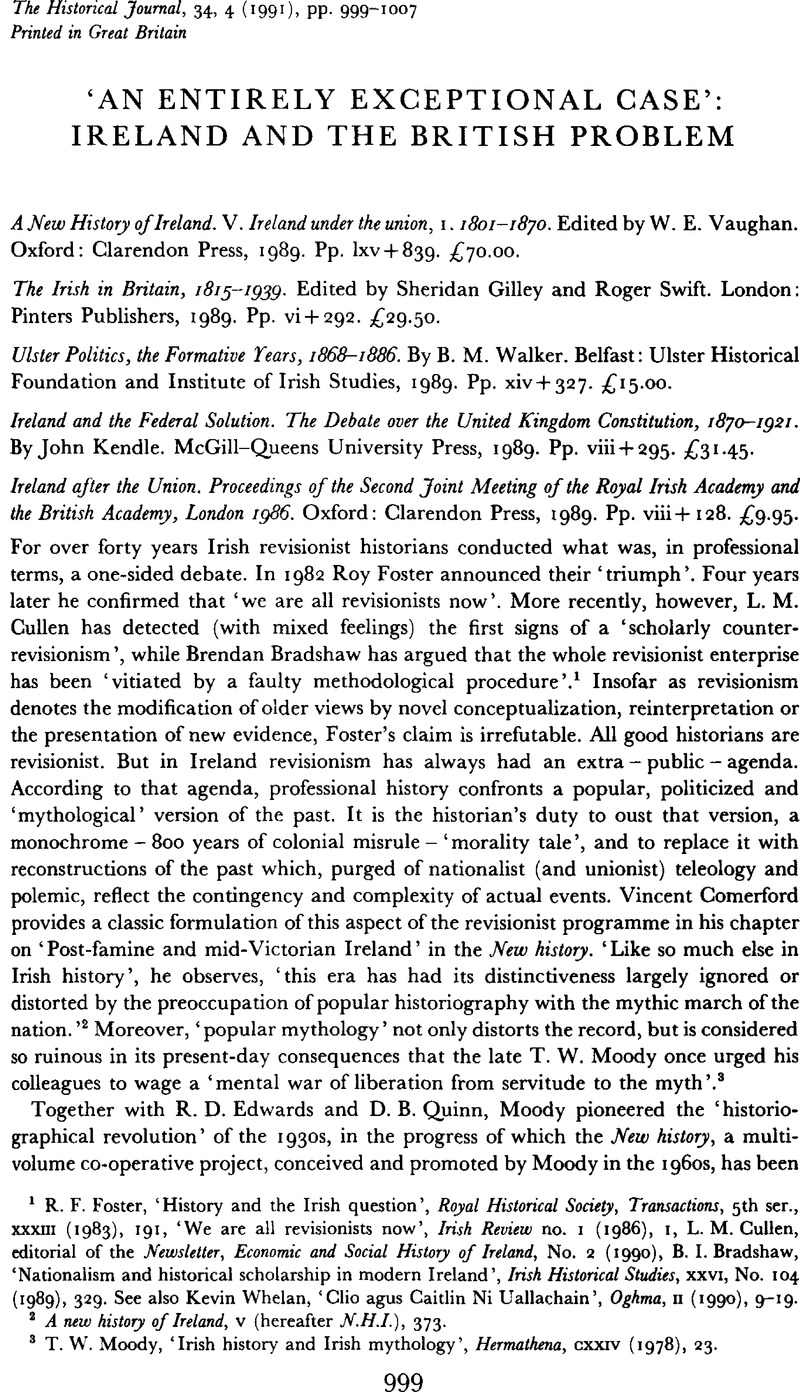Article contents
‘An Entirely Exceptional Case’: Ireland and the British Problem
Published online by Cambridge University Press: 11 February 2009
Abstract

- Type
- Review Articles
- Information
- Copyright
- Copyright © Cambridge University Press 1991
References
1 Foster, R. F., ‘History and the Irish question’, Royal Historical Society, Transactions, 5th ser., XXXIII (1983), 191Google Scholar, ‘We are all revisionists now’, Irish Review no. 1 (1986), IGoogle Scholar, Cullen, L. M., editorial of the Newsletter, Economic and Social History of Ireland, No. 2 (1990)Google Scholar, Bradshaw, B. I., ‘Nationalism and historical scholarship in modern Ireland’, Irish Historical Studies, XXVI, No. 104 (1989), 329CrossRefGoogle Scholar. See also Whelan, Kevin, ‘Clio agus Caitlin Ni Uallachain’, Oghma, II (1990), 9–19Google Scholar.
2 A new history of Ireland, V (hereafter N.H.I.), 373.
3 Moody, T. W., ‘Irish history and Irish mythology’, Hermathena, CXXIV (1978), 23Google Scholar.
4 See the comments of Hayton, David and O'Brien, Gerard in Hayton, and O'Brien, (eds.) Simms, J. G., War and politics in Ireland, 1649–1730 (London, 1986), p. ixGoogle Scholar. Also Foster, R. F., ‘The problems of writing Irish history’, History Today, XXXIV (1984), 28Google Scholar. For Terence Brown the new history project signalled the coming of age of Irish historiography: Ireland, a social and cultural history, 1922–79 (Glasgow, 1981), p. 292Google Scholar.
5 Bartlett, T., ‘A new history of Ireland’, Past and Present, CXVI (1987), 207Google Scholar. For Moody's own account of the genesis of the project see Moody, T. W., ‘A new history of Ireland’, Irish Historical Studies, XVI, no. 63 (1969), 241–57CrossRefGoogle Scholar.
6 McGuire, J., ‘T. Desmond Williams (1921–87)’, Irish Historical Studies, XXVI, No. 101 (1988), 6Google Scholar, Clarke, A., ‘Ireland, 1534–1660’, in Lee, J., ed., Irish historiography, 1970–79 (Cork, 1981), p. 34Google Scholar.
7 N.H.I., V, 384–5.
8 The phrase is Waters, Martin J.: ‘Irish history without villains? Some recent work on the nineteenth century’, Victorian Studies, XVI, No. 2 (1972), 223–34Google Scholar.
9 N. H. I. V, 390.
10 Lewis cited by O'Sullivan, P., ‘A literary difficulty in explaining Ireland: Tom Moore and Captain Rock, 1824’, in Gillay, and Swift, (eds.) The Irish in Britain, pp. 239, 248Google Scholar.
11 E.g. The chapter ‘Landscape with bandits’ in Steward, A. T. Q., The narrow ground, The roots of conflict in Ulster (Belfast, 1989 edn), pp. 113–22Google Scholar, Beames, M. R., Peasants and power: the Whiteboy movements and their control in pre-famine Ireland (Brighton, 1983)Google Scholar, Beames, ‘The Ribbon societies: lower-class nationalism in pre-famine Ireland’ and Gavin, T., ‘Defenders, Ribbonmen and others: underground political networks in pre-famine Ireland’ in Philipin, C. H. E., ed., Nationalism and popular protest in Ireland (Cambridge, 1987)Google Scholar.
12 Palmer, S. H., Police and protest in England and Ireland, 1780–1848 (Cambridge, 1988), p. 538Google Scholar.
13 Foster, , ‘Writing Irish history’, p. 30Google Scholar.
14 N.H.I., V, lviii, 242.
15 Moody, , ‘Irish history and Irish mythology’, pp. 19–21Google Scholar, Foster, in Philipin, , ed., Nationalism and popular protest, pp. 8–9Google Scholar, Heesom, A., ‘Ireland under the union’, History Today, XXXIV (1984), 34Google Scholar, Walker, B. M., Ulster politics, p. 4Google Scholar. All these authors refer to the work of Vaughan, W. E., most readily accessable in Landlords and tenants in Ireland, 1984–1904 (Dublin, 1984)Google Scholar.
16 N.H.I., V, 129.
17 Wells, R., Insurrection, the British experience, 1795–1806(Gloucester, 1983), p. xiiiGoogle Scholar.
18 N.H.I., V, 361–2.
19 M.H.I., V, 623.
20 Gillay, and Swift, , (eds.) The Irish in Britain, p. 129Google Scholar.
21 Walker, , Ulster politics, pp. 255, 266Google Scholar.
22 Ibid. pp. 21, 48–9.
23 N.H.I., V, 698–99.
24 Cited by Kendle, , Ireland and the federal solution, p. 81Google Scholar.
25 Morgan, , ‘Lloyd George and the Irish’, Ireland after the union, p. 93Google Scholar.
26 Fanning, , ‘Britain, Ireland and the end of the union’, Ireland after the union, p. 106Google Scholar.
27 Cited by Fanning, ibid. p. 119.
- 2
- Cited by


